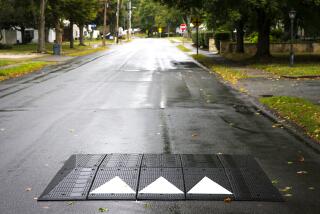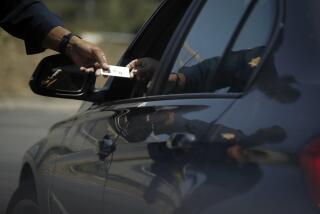Op-Ed: How much is too much for a traffic ticket? And who should get the revenue?
If a mother earning minimum wage puts her kids in the family car, has her eyes on the road when her disobedient 14-year-old slips off his annoying shoulder belt and gets pulled over, what’s an appropriate punishment? The Golden State’s answer: The minimum fine for not properly restraining a child under 16 is $465, or a bit more than our poor driver earns in a whole week.
For her, the effective penalty is 40 hours labor; more if she cannot pay on time, or misses a court date, or gets written up for another infraction found during the traffic stop. And if she cannot pay at all, she might even lose her license and be unable to get to work.
As a report released this month by the Lawyers’ Committee for Civil Rights put it, “Some Californians mail in a payment, while those who cannot pay experience license suspension, arrest, jail, wage garnishment, towing of their vehicles, and job loss for the same minor offenses.” At one point in April, 588,939 Californians had suspended licenses because they could not pay or appear in court, not because their driving posed a threat to public safety.
It’s a reverse lottery where unlucky losers pay little jackpots to the state and budget shortfalls create perverse incentives to give more tickets.
Outcomes of that sort have inspired prominent calls for reform. They caused Gov. Jerry Brown to dub California’s traffic court system a “hellhole of desperation” in 2015, when he granted an amnesty to some residents with suspended licenses. They caused California Chief Justice Tani Cantil-Sakauye to urge that most traffic tickets be handled in civil rather than criminal court. And they inspired a bill now before the California Legislature that would compel traffic courts in the state to “reduce the base fine and associated fees by 80% if the court establishes that the defendant is indigent, and to provide alternatives to immediate payment of the sentence, including a payment plan option.”
Relief for the poor would be a step toward the logic used in parts of Scandinavia, where some traffic fines are assessed as a percentage of one’s income, perhaps on the logic that the incentives needed to stop the very rich and the very poor from lawbreaking are very different.
In Finland, the rich occasionally receive eye-popping fines. “In 2002, a Nokia executive was fined the equivalent of $103,000 for going 45 in a 30 zone on his motorcycle,” Joe Pinsker reported in the Atlantic, “and NHL player Teemu Selanne incurred a $39,000 fine two years earlier.”
That strikes me as excessive in the opposite direction. A serially dangerous driver should not be allowed on the road at any price. And a minor slip-up, like going 45 in a 30 mph zone, shouldn’t cost a small fortune simply because the driver happens to have earned one at work. And though the excesses of California and Finland cut in opposite directions, I suspect that they have the same cause, one that is unfortunately unaddressed by any current reform attempts.
The root of the problem: The purpose of traffic fines isn’t just to discourage dangerous driving and maintain safe roads but to generate revenue, because politicians and bureaucrats are always hungry for more money to spend, and voters are typically averse to raising taxes.
The San Francisco Chronicle reports that “California courts have filled chronic holes in their budgets by adding surcharges to traffic tickets — $490 to the standard $100 fine for a minor violation, like a broken taillight.” It’s a reverse lottery where unlucky losers pay little jackpots to the state and budget shortfalls create perverse incentives to give more tickets.
Of course the word “unlucky” makes the process seem random. Actually, under a regime where “fix-it” tickets and late fees are most lucrative, revenue conscious cops have an incentive to target old, beat-up cars. In Finland’s system, cops have an incentive to target luxury cars.
Whether we should have progressive or graduated ticket pricing like we have a graduated income tax, the fairest reform is to sever the relationship between tickets and the revenue the ticketing jurisdiction gets. (Everyone’s in on the take, including the state, the county and various courts.) That money should be pooled and then sent out every few years as a tax rebate; or used to defray the cost of registering a vehicle for California motorists; or put in a rainy day fund.
It seems unlikely that local politicians will voluntarily give up any control, but a ballot initiative could do the trick. And if the number of tickets written under the new, pooled system craters, that’ll prove that the number written under the old system was artificially high.
Conor Friedersdorf is a contributing writer to Opinion, a staff writer at the Atlantic and founding editor of the Best of Journalism, a newsletter that curates exceptional nonfiction.
Follow the Opinion section on Twitter @latimesopinion or Facebook
More to Read
A cure for the common opinion
Get thought-provoking perspectives with our weekly newsletter.
You may occasionally receive promotional content from the Los Angeles Times.






